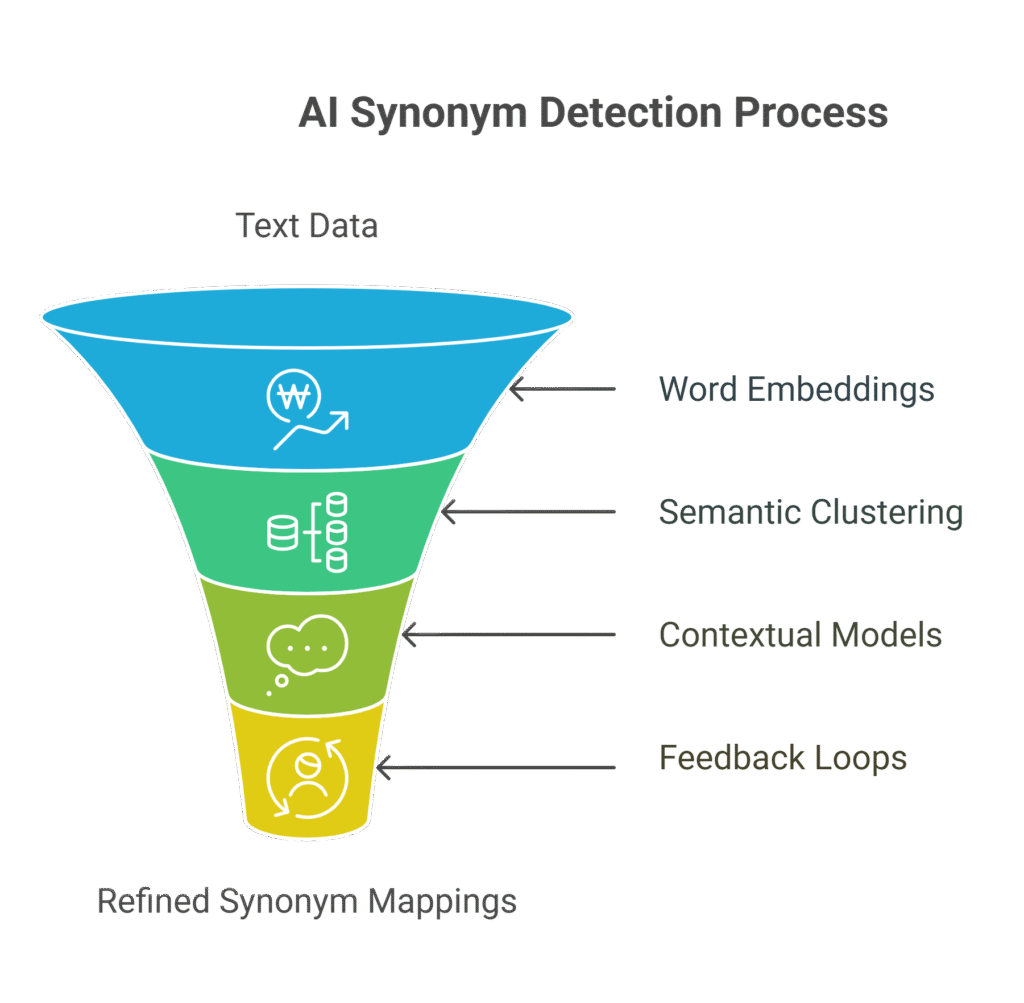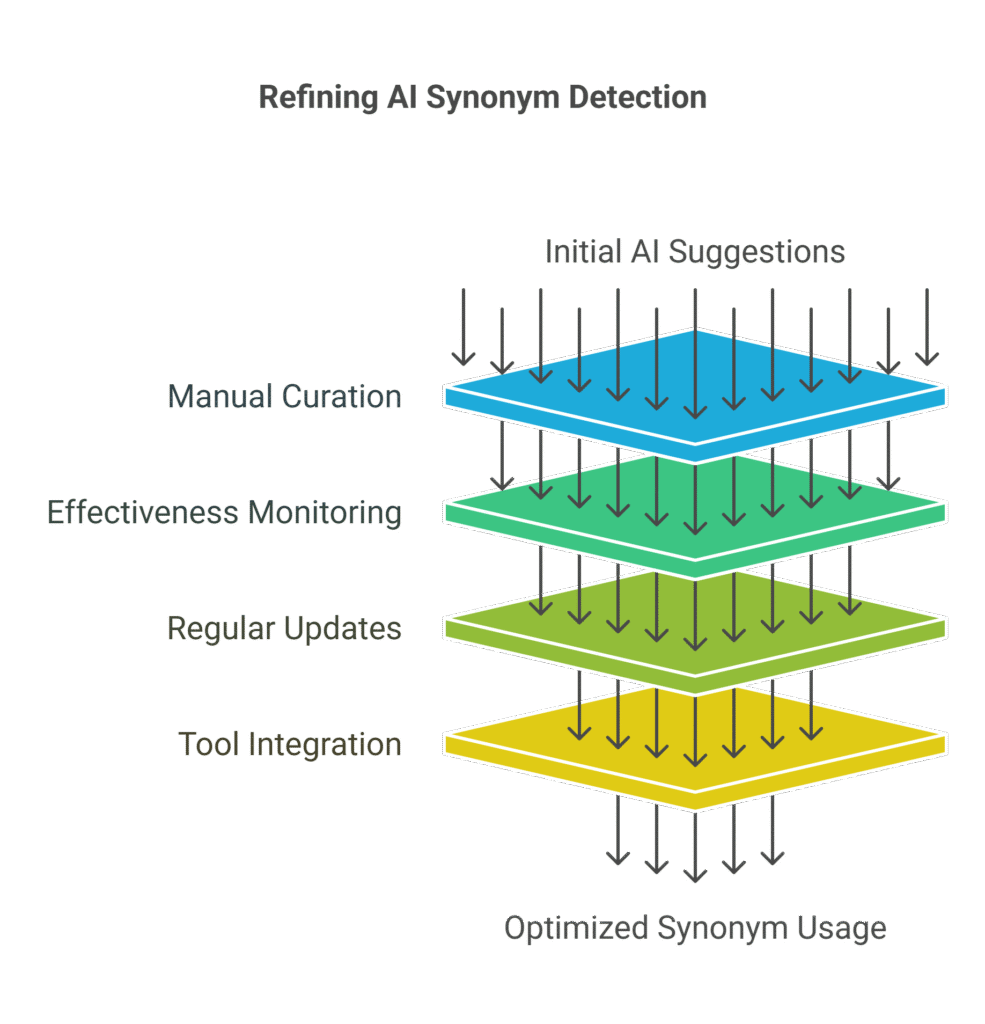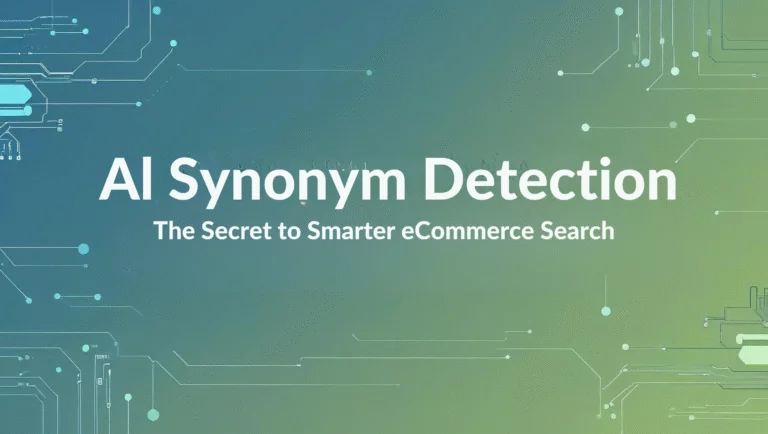In today’s digital marketplace, the way customers search often doesn’t match the exact terminology used in your product catalog. That’s where AI synonym detection steps in, bridging the language gap between what users type and what your store actually offers.
In this blog, we’ll break down what AI synonym detection is, how it works, and why it’s crucial for improving search performance in eCommerce.
What Is AI Synonym Detection?
AI synonym detection is the process of using artificial intelligence, especially natural language processing (NLP), to automatically recognize and link different terms that have similar meanings.

For example, if a user searches for “hoodie,” your search engine will also surface results labeled as “sweatshirt,” even if that word doesn’t appear in the product title or description.
This goes far beyond manually entering synonym pairs. AI models can learn synonym relationships from search behavior, user feedback, and contextual understanding, creating a far more intelligent and scalable solution.
Why Is Synonym Detection Important in eCommerce Search?
1. Users Don’t Speak Like Your Product Database
Shoppers rarely search using the exact terms your internal team uses to label products. Someone might type “joggers” when your product titles say “track pants.” Without synonym detection, that shopper sees a “no results” page, even though relevant products exist.
2. Better Recall, Without Losing Precision
AI-powered synonym detection improves search recall (more relevant results) without reducing precision (irrelevant matches). It ensures the engine understands that “couch,” “sofa,” and “loveseat” are contextually linked, helping customers find what they want, even if your listings don’t use their exact words.
3. Increased Conversions
By delivering relevant results regardless of phrasing, you reduce the chance of bounce and increase the likelihood of purchase. According to Forrester Research, optimized site search can boost conversion rates by up to 50%.
How AI Detects Synonyms (Under the Hood) ?
AI synonym detection relies on several key technologies:

- Word Embeddings
Using models like Word2Vec or GloVe, the system learns the relationship between words based on their usage in massive text datasets. Words used in similar contexts (like “blazer” and “jacket”) end up with similar vector representations. - Semantic Clustering
AI clusters terms based on meaning, usage frequency, and syntactic behavior. This helps identify both obvious and subtle synonyms in your niche—like “gown” vs. “evening dress.” - Contextual Models (like BERT)
Modern language models like BERT understand word meaning based on surrounding context. This helps avoid errors where words have multiple meanings. For example, “apple” can be a fruit or a brand—and AI can learn which meaning fits the query. - Feedback Loops
Search engines integrated with AI collect feedback data—click-through rates, bounce rates, and conversions—to refine synonym mappings over time.
Real-Life Example in eCommerce
Let’s say you sell electronics. Your catalog lists “earbuds,” but your customer searches for “wireless earphones.”
Without synonym detection, the search engine might return no results. But with AI synonym detection in place, the engine recognizes “earbuds” and “wireless earphones” as equivalent and returns the right products.
Similarly:
- “Formal shoes” = “dress shoes”
- “Cell phone” = “smartphone”
- “Gaming laptop” = “high-performance laptop”
Best Practices for Implementing AI Synonym Detection

- Combine AI with Manual Curation
AI can catch most patterns, but domain experts should still review edge cases. For example, fashion brands may use “maxi dress” and “evening gown” interchangeably—AI can suggest it, and merchandisers can approve it. - Use Analytics to Monitor Effectiveness
Track what terms lead to conversions vs. what causes exits. Identify which synonyms are helping and which may be diluting relevance. - Update Regularly
Language evolves. New slang, seasonal trends, and viral product names can change how people search. Let your AI model adapt and retrain with fresh data. - Leverage AI Tools with Built-in Synonym Detection
Platforms like ExpertRec come with synonym mapping powered by AI, out of the box. You can also add manual synonym rules as overrides.
What Happens Without Synonym Detection?
- More “no results” pages
- Higher bounce rates
- Lost revenue from missed intent
- Frustrated shoppers who turn to competitors
In short, lacking AI synonym detection is like trying to run a store where staff doesn’t understand the local language. Even if the product is perfect, it stays on the shelf.
Is There Any Tool That Makes Synonym Detection Easy ?
Yes, ExpertRec’s AI-powered search engine includes synonym detection, fuzzy matching, and semantic understanding. With features like:
- Auto-suggestion and query expansion
- Clickstream-based feedback learning
- Manual synonym override controls
- Real-time analytics
It helps eCommerce businesses optimize product discovery and ensure no customer query goes unanswered.
Conclusion
AI synonym detection isn’t just a technical upgrade—it’s a customer experience revolution. By understanding the intent behind every search, it ensures your products show up when and where they’re relevant, not just when they’re labeled “correctly.”
In a world where shoppers type fast, think casually, and expect perfect results, synonym detection powered by AI is no longer optional. It’s the backbone of a search engine that works the way people shop.
Ready to add AI synonym detection to your store’s search engine?
→ Book a free demo with ExpertRec and see how AI search boosts conversions.
Frequently Asked Questions
What is AI synonym detection and how is it different from manually mapping synonyms?
AI synonym detection uses machine learning to auto-identify word pairs based on context and user behavior. Unlike manual mapping, it scales across thousands of terms without manual input.
Why is synonym detection important for eCommerce search?
Customers use varied terms (“sneakers” vs. “running shoes”). AI synonym detection ensures relevant products appear regardless of phrasing, improving conversions and reducing drop-offs.
How does AI actually “learn” which words are synonyms?
It analyzes language data—like product listings and search behavior—to detect patterns. If two terms appear in similar contexts, AI treats them as related.
Can I control or override AI-detected synonyms?
Yes. Tools like ExpertRec let you approve, edit, or add your own synonyms. This ensures brand consistency while benefiting from automation.
Add industry-specific synonym rules (e.g., “onesie” = “bodysuit”)
Does synonym detection affect SEO or indexing?
No. Synonym detection only improves internal search relevance. It doesn’t alter your site content or hurt SEO.
How can I implement AI synonym detection on my WordPress or WooCommerce store?
Install an AI-powered search plugin like ExpertRec. It integrates with WordPress/WooCommerce. It auto-detects synonyms and improves on-site search, all with easy setup and no coding.




